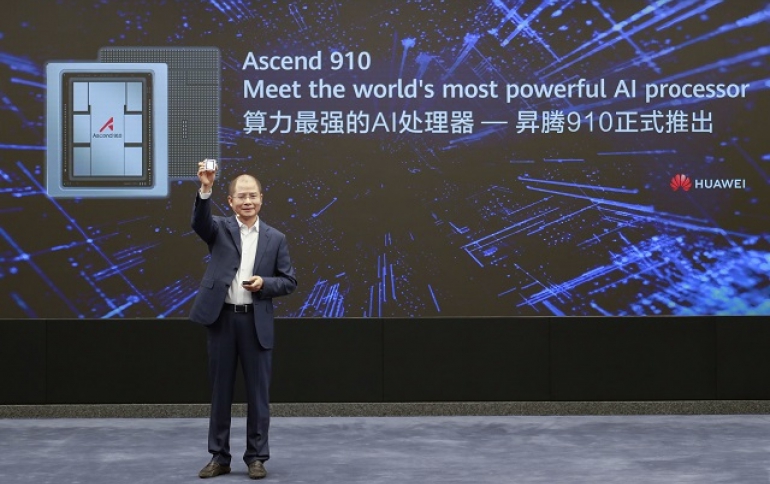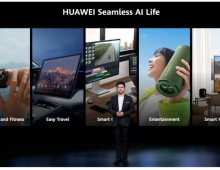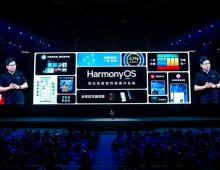
Huawei Says Ascend 910 is The World's Most Powerful AI Processor
Huawei officially launched today at Shenzhen what the company calls the "world's most powerful AI processor" - the Ascend 910 - as well as an all-scenario AI computing framework, MindSpore.
"We have been making steady progress since we announced our AI strategy in October last year," said Eric Xu, Huawei's Rotating Chairman. "Everything is moving forward according to plan, from R&D to product launch. We promised a full-stack, all-scenario AI portfolio. And today we delivered, with the release of Ascend 910 and MindSpore. This also marks a new stage in Huawei's AI strategy."
The Ascend 910 is a new AI processor that belongs to Huawei's series of Ascend-Max chipsets. Huawei announced the processor's planned specs at its 2018 flagship event, Huawei Connect. After a year of development, Huawai's test results show that the Ascend 910 processor delivers on its performance goals with much lower power consumption than originally planned.
For half-precision floating point (FP16) operations, Ascend 910 delivers 256 TeraFLOPS. For integer precision calculations (INT8), it delivers 512 TeraOPS. Despite its performance, Ascend 910's max power consumption is only 310W, much lower than its planned specs (350W).
Ascend 910 is used for AI model training. In a typical training session based on ResNet-50, the combination of Ascend 910 and MindSpore is about two times faster at training AI models than other mainstream training cards using TensorFlow, according to the Chinese company.
Huawei also launched MindSpore today, an AI computing framework that supports development for AI applications in all scenarios.
As privacy protection grows more important than ever, support for all scenarios is essential for enabling secure, pervasive AI. This is a key component in the MindSpore framework, which can readily adapt to different deployment needs. Resource budget environments can be as large and complicated or small and simple as needed – MindSpore supports them all.
MindSpore helps ensure user privacy because it only deals with gradient and model information that has already been processed. It doesn't process the data itself, so private user data can be effectively protected even in cross-scenario environments. In addition, MindSpore has built-in model protection technology to ensure that models are secure and trustworthy.
The MindSpore AI framework is adaptable to all scenarios – across all devices, edge, and cloud environments – and provides on-demand cooperation between them. Its "AI Algorithm As Code" design concept allows developers to develop advanced AI applications with ease and train their models more quickly.
Huawei says that in a typical neural network for natural language processing (NLP), MindSpore has 20% fewer lines of core code than leading frameworks on the market, and it helps developers raise their efficiency by at least 50%.
When introducing MindSpore, Xu emphasized Huawei's commitment to helping build a more robust and vibrant AI ecosystem. "MindSpore will go open source in the first quarter of 2020. We want to drive broader AI adoption and help developers do what they do best."
At Huawei Connect 2018, Huawei also announced its AI strategy and full-stack, all-scenario AI portfolio, including the Ascend 310 AI processor and ModelArts that provides full-pipeline model production services.
Ascend 310 is Huawei's first commercial AI System on a Chip (SoC) in the Ascend-Mini series. With a maximum power consumption of 8W, Ascend 310 delivers 16 TeraOPS in integer precision (INT8) and 8 TeraFLOPS in half precision (FP16), making among the most powerful AI SoC for edge computing. It also comes with a 16-channel FHD video decoder.
Ascend 310 also enables Huawei Cloud services like image analysis, optical character recognition (OCR), and intelligent video analysis. There are more than 50 APIs for these services.
At the end of his presentation, Xu added that Huawei will debut more AI products at its upcoming conference, Huawei Connect 2019, which will be held between September 18 and 20 in Shanghai.





















